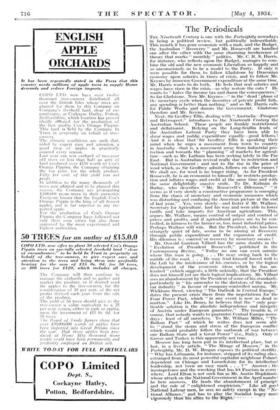The" 'Periodicals THE Nineteenth Century is one with the Fortnightly
nowadays in being a political review, but politically indescribable.. This month it has.gone economic With a rush, and the Budget, the Australian "-Recovery " and Mr. Roosevelt are handled one after the other With the -same charming incoherence of theory that marks " monthly " politics. Mr. C. R. S. Harris, . for instance; who reflects upon the Budget, manages to com- bine the old and-the new economic Liberalism so happily and so unconsciously. as to be a model to the Party. If only it were possible for them ,to follow Gladstone by Draconian economy upon salaries in times of crisis, and to follow Mr. Keynes by immense Government expenditure at the same time. Mr. Harris wants tb do both. He feels that real salaries and Wages have risen in the Crisis—so why restore the cuts ? He wants to " halve the income tax and damn the consequences." SO far Gladstone. Now Mr. Keynes—" in the dead phase Of the monetary cycle when the incentiveof private profit fails, any spending is better than nothing," and so Mr. Harris calls for Public Works and damns the Gcivernment Gladstone therefore and Mr. Keynes. ' Next, Sir Geoffrey Ellis, dealing with "Australia—Prospect and Retrospect," introduces to the Nineteenth Century the Australian School. These people are frankly restrictionist and deflationist: Relying on the Lang-Scullin feuds of the Australian Labour Party they have been able td shear wages and publie expenditure equally—good fellows ! And it is clear that' Sir Geoffrey Ellis is speaking their mind when he urges a movement from town to country in Australia--that is, a movement away from industrial pro- tection and towards the " planning " of markets for agricul-; ture—such as Mr. Latham has been seeking lately in the FOr East. But is Australian revival really due to restriction and National Government : and not to the rise in the price of wool which, as Sir Geoffrey admits:, follows on other causes? We shall see, for wool is no longer rising. As for President Roosevelt, he is an economist to himself : he restricts produe- tion and inflates wages and credit at the same time and with the same delightfully suasive smile. To Dr. Kalman de Buday, who describes "Mr. Roosevelt's Dilemma," "it seems as if very slowly a constructive programme is emerging from the chaos of monetary and economic measures which was disturbing and confusing the American picture at the end of last year.' _ Yes, very slowly—and faster if Mr. Wallace, Secretary for Agriculture, had his way and were able t61oWer tariffs and take imports for American agriculture. This, argues Mr. _Wallace, means control of output and control of prices and profits, and if agricultural prices are to be-Con- trolled, in fairness to the farmer so, too, must industrial prices. Perhaps Wallace will win. But the President, who has been strangely quiet .bf late, seems to be aiming at Recovery through public expenditure ' and the expansion of credit. His dilemma is : control,' or recovery by monetary means ?
Mr. Oswald Garrison Villard has the same doubts in the "Evolution of President Roosevelt," published in the Contemporary Review. "Today no one can even surmise where this man is going. . . . He may swing back to the ' middle of the road. . . . He may find himself forced well to the Left by the intolerance of his enemies, or by the logical development of the economic ideas which he has un- leashed" (which suggests, a little unkindly, that the President does not himself yet see.their logical implication). Mr. Villard sees an abandonment by the President of some of his standards, particularly in "his surrender to the dictators of the rnOtcir- ear industry" in favour of company-controlled unions. :Mr. -Wickham Steed, viewing "The Outlook in Central Europe," dates the present• crisis there from the negotiations for the Four Power Pact, which "in any event -is now as dead as mutton." Like Dr. Benes, he believes that the "only prac- ticable solution is the absolute independence and integrity of Austria under European guarantee." .The trouble is, of course, that nobody wants to guarantee Central Europe nowa- days: least of all ourselves. To Mr. William Miller, "The Balkan Pact" of which- he .writes does not seem able to "stand the storm and stress of the European conflict which would probably follow the outbreak of war between one Balkan State and a Great Power" (i.e., Italy). Only of Greece and Turkey is this apparently not true. Moscow has long been put in its intellectual place, but at last, in a lively article, The Mirage of Moscow," in the Fortnightly, Mr. D. W. Brogan exposes its political sterility. "Why has Lithuania, for instance, stripped of its ruling class, estranged from its most powerful capitalist neighbour Poland, dependent on Chicago and Lanarkshire for its intelleetual
leadership, not been an easy mirk . ? " Answer : the incompetence and the Wrecking that has let Fascism in every- where. Lord Elton is not such fun as Mr. Austin Hopkinson, whose attack on the National Government in the Apritnumber he here answers. He lauds the abandonment of principle and the rule of "enlightened empiricism." Like all good
National Labour men, he sees no safety except in the "Na- tional Alliance," and has to play. the Socialist bogey more -vigordbsTy 'thetillffs' allies to-Aire-Right- "-- — - -












































 Previous page
Previous page